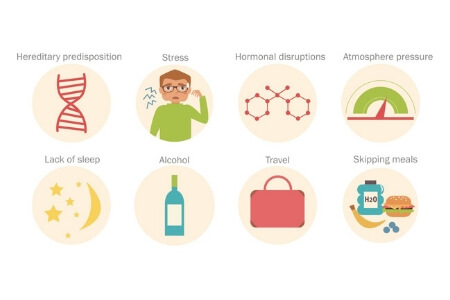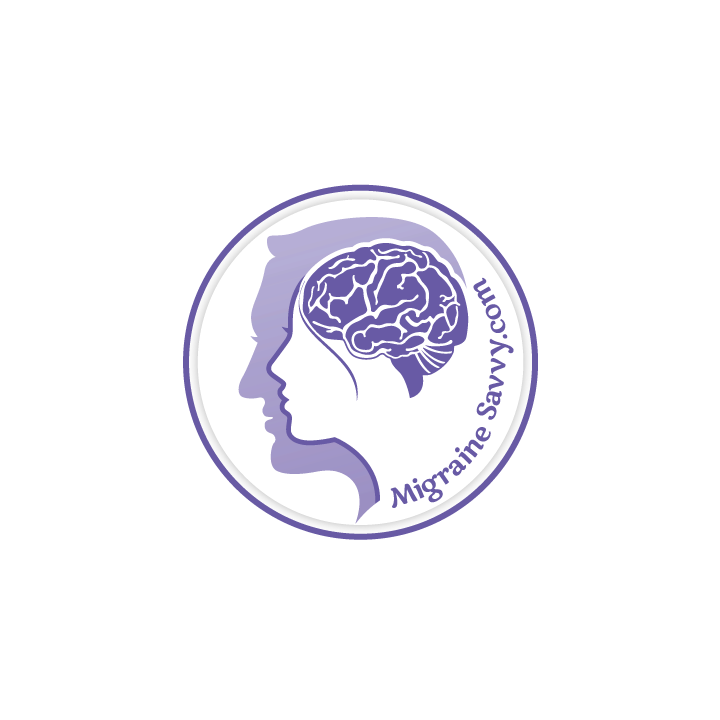COMPLETE MAGNESIUM SUPPORT
My Top Choice - Magnesium Breakthrough - The ONLY supplement with all 7 essential magnesium types in one formula. Most only have 1-2 types, leaving you deficient.
The best remedy for dehydration headache: Is it Salt?
What is the best remedy for dehydration headache? Is it just drinking a liter of plain water, or adding salt when you feel triggered? If so, how much salt? Here's what you need to do and experiment with, to find your best remedy.
Can dehydration even cause a migraine attack? Yes, absolutely.
Dehydration is a well known migraine trigger. So let's take a deeper look into proper hydration so you can avoid dehydration all together. We'll even look into the Medical Medium's miracle cures for hydration: celery juice, cucumber water, and... well... you'll have to keep reading and scroll down for all the surprises and tips.
 The Best Remedy For Dehydration Headache @migrainesavvy
The Best Remedy For Dehydration Headache @migrainesavvyIn this article, you will learn:
- The Basics of Dehydration: Symptoms, Treatment, Prevention
- Daily Prevention Tips
- What About Using SALT? Is Salt The Best Remedy for Dehydration Headache?
- How Much Salt?
- How To Get Water From Your Food
- Top 12 Hydrating Fruits
- Top 12 Hydrating Veggies
- Is Water The Best Remedy for Dehydration Headache?
- The Best Remedy for Dehydration Headache
- My Top 11 Tips for Staying Hydrated
- A Few Good Recipes (including the best remedy for dehydration headache from the Medical Medium)
The Hydration Foundation says that "water requires movement to stay energized. Even inside our bodies, water needs to move to have its potent cleansing and healing effect. How much we move has far more impact on our hydration than we previously thought. The human body is a hydraulic pump system and squeezing, twisting and contracting all deliver hydration more deeply into our tissues. Our spinal canal and joints are central to this hydraulic system, as is fascia, our sponge-like connective tissue found throughout our bodies, in fact there’s miles of it in there." [1]
Our fascia has recently been discovered to be "a hidden irrigation system, a hidden electrical system" and it's all conducted by water that sends instant cell-to-cell communication. It’s like our own internal internet. And to work well, it must be fully hydrated. [1]
To me, this includes the electrical system that is so effected in our migraine brain causing attacks.
So hydration isn’t just about drinking a liter of water three times a day. It's also about "pumping it out to all our tissues and hydrating them enough so that it runs our electric current beautifully, without static or brownouts." Getting our bodies moving, even the smallest amount, will start this distribution of water and electricity. [1]
The Basics of Dehydration
Our bodies are 65% water. So when we lose more water than we take in, dehydration occurs. We also lose electrolytes as well, which makes this all more complicated.
You may need to experiment to find the best remedy for dehydration headache.
In order to replace the water your body can lose in a 24-hour period, it will take an average of 64 to 80 ounces (1.892 - 2.365 liters) of fluids to rebalance. [3]
According to Teri Robert at Migraine.com:
- Losing as little as 1 or 2% of body weight in fluid can result in dehydration.
- Losing as little as 3 to 5% can negatively impact concentration, judgment, and reaction time.
- Losing 9 — 15% results in severe, life-threatening dehydration.
Now you've probably already noticed that your water needs change depending on how active you are or how hot it is. But there are more circumstances to consider like: living at a higher altitude; when you have a cold or flu or when you experience vomiting or diarrhea.
Other chronic diseases like "uncontrolled or untreated diabetes, cystic fibrosis, kidney disease, alcoholism, or adrenal disorders" can also have an impact. Certain medications and travelling on a long air flight will also impact on your body's fluid levels. [3]
There are also possible dietary contributors to dehydration including: salty foods, alcohol, and caffeine also have an effect.
So you can see there are a lot of factors that can contribute to dehydration. And with a sensitive migraine brain you can see how easy it is for dehydration to become a trigger.
Here are some potential symptoms of dehydration:
- Headache
- Confusion
- Less frequent need to urinate and/or decreased urine output
- Dark colored urine (should be nearly clear to pale yellow, dehydrated is closer to brown)
- Dizziness
- Extreme thirst
- Fatigue
- Increased heart and respiration rates
- Muscle weakness
- Dry mouth, lips and eyes
- Skin not snapping back when pinched and released* [3]
* You can test the skin between your thumb and index finger. Pinch the top and see if it snaps back.
Dry lips are a sign for me to hydrate.
Treatment:
If you are feeling dehydrated or triggered, depending on the cause and severity, you can treat it at home. Try to treat it as soon as possible. Some say that if you feel thirsty, you are already on your way to being dehydrated.
If it gets worse than that, IV fluids may be required, and severe dehydration is a medical emergency. [3] As a migraine trigger there are some great tips below... and I think daily prevention is essential.
About 1/3 of people with migraine say dehydration is a trigger, and for some, even the slightest hint of dehydration can be the fast track to debilitating head pain. Dehydration affects the body on all levels and can cause dizziness, confusion, and can even become a medical emergency.
~ American Migraine Foundation.org

Daily Prevention Tips
It is so much better to plan ahead and stay well hydrated than to need to treat dehydration. Here are some basic steps you can take to help prevent dehydration every day:
- According to your weight, calculate your required DAILY water intake.
- Keep alcohol and caffeine (all forms) to a minimum.
- Eat foods that are nice and high in water content. Fruit contains the most water, followed by vegetables. Scroll down for the list of the top foods the Hydration Foundation recommends.
- Get some good smoothie recipes. Don't drink fruit juices - they are too sugary. And sugar is a migraine trigger too. Plus drinking too much of them can cause diarrhea, which can be dehydrating.
- Plan ahead for highly active days, or outings in hot weather. Look for shady areas. And start hydrating a day before. [3]
- Try to plan your outdoor activities for cooler parts of the day (Australia only in the morning!).
- Discuss preventing dehydration with your doctor if any of the medications you need to take have dehydration as a side effect.
Is Salt The Best Remedy for Dehydration Headache?
What about using SALT?
Salt is a Hydrating Solution
Yes, salt can help you stay hydrated. But natural (unrefined) and processed salts are not the same. Natural salts contain sodium, potassium, and many other trace minerals. Processed salts do not.
"Sodium provides positively charged ions while potassium provides negatively charged ions. This combination generates electrical charges in our cell membranes and keeps cells functioning. If you don’t have enough salt in your system, your body’s internal charge is not balanced and cells can’t receive and transmit impulses the way they should." [2]
You can use a small amount of natural salt, it is absolutely essential for hydration. [2]
Did you know that just a pinch of salt... real salt, like sea salt, pink salt, rock salt, any unrefined, unprocessed salt, just a pinch, in your glass or water bottle, could increase hydration by almost one third?
The conclusion of a recent study found: “those who had pre-hydrated with sodium drank less than half as much water during the race as those who pre-hydrated with water only, but they were also more than one-third less dehydrated after the race, and their sweat rates were less!”
~ Hydration Foundation.org [6]
The full report of this study from Runner’s Magazine can be found here.
"Natural salts carry many trace minerals that turn into electrolytes when activated by water. They turn that water into a source of electrical conductivity, just the kind your body needs for energy and healing. Your body uses hydration for fuel and hydrating becomes easier with less liquid." [6]
So as a person living with migraine, I use salt every day to help my body hydrate. I also live in Australia... in the tropics. HYFO recommends carrying a small container or zip locked bag of unprocessed salt and tossing a pinch in your next drink - it will then become a hydrating drink.
They say to "pinch over your glass in a restaurant, at the airport, or at work." [6]
As always, talk to your doctor first about all of this. You may have other health conditions where adding salt may be contraindicated.
Now... let's look at the best remedy for dehydration headache and how to get properly hydrated using salt and electrolytes.
How Much Salt?
The official guidance is that we should eat no more than 6 grams of salt a day, which is about one teaspoonful. [7]
The 'rules' were developed by Dr. Angela Stanton (PhD), a neuroscientist from Southern California, who herself has suffered from migraines since she was ten years old.
Her theory, built on over 6 years of personal research, is that the 15 per cent or so of the population who get migraines need extra salt because they have highly sensitive, 'super alert' brains.
"Super-alert people have more brain cell connections than most of the population," says Dr. Stanton. "So they need a bigger supply of electrolytes - the minerals in the body that carry electrical charges which keep us alive." [7]
She says the best remedy for dehydration headache and migraine is not just salt, but "it requires a careful balance of salt, particularly the sodium in it, and another key electrolyte, potassium." [7]
This mineral is best consumed through potassium-rich fresh meat, vegetables, fruit and dairy products.
According to Dr. Stanton’s theory, anyone susceptible to migraine is extra-sensitive to insufficient levels of sodium as well as chloride, with the correct balance for people with migraine needing to be identified individually and then maintained rigidly.
An average ratio for a migraine sufferer, she says, is two parts potassium to one-and-a-half parts salt consumed at each meal, although for some it’s equal amounts of both, while others need twice the amount of sodium to potassium. [7]
Every sufferer should start the day with one-eighth of a teaspoon of salt or a salt pill. The migraine brain is very active while sleeping.
~ Dr. Angela Stanton PhD [7]
But to date, migraine specialists are entirely unconvinced of this theory. [7]
You can read more studies on salt here. I start the day with 1/4 teaspoon of pure salt.
So you can now see how tricky and delicate finding the best remedy for dehydration headache and migraine can be.
Let's look at some easier options too, so you can find your best remedy for dehydration headache and how to get properly hydrated from food.
How To Get Water From Your Food
Water from fresh food can be up to two thirds more hydrating than water from a glass.
~ Hydration Foundation.org [2]
Hydrating your body using water AND food is absolutely the smartest strategy on the planet, and it's one that's perfectly designed by nature for us. [2]
The living water or, also called, gel water in fruits and vegetables is structured by nature, and it's much more nutritious and more hydrating than liquids. It's packed with fruit or veggie fibers to help us absorb the water and not just flash flood through. [2]
Fruits and vegetables are nutrient rich. They're packed with antioxidants, proteins with their amino acids, and lots of vitamins. But more importantly they also carry minerals (calcium, magnesium, potassium, and sodium) that are activated by the electrical charge in water - turning into our much needed electrolytes.
We need electrolytes for energy. How drained do you feel after an attack... right?
"We need this fuel not only for biological nutrition but also for cognition, judgement, and mood. And get this, because of the fiber in plants, the water stays in our system longer because we absorb it more slowly. It’s a triple play of hydrating health: pure nature’s water, absorbent fiber, and not only needed nutrients but electrolytes!" [2]
Here are the fruits and vegetables with the top water content from the Hydration Foundation:
Top 12 Hydrating Fruits
- Starfruit – 91.4%
- Watermelon – 91.4%
- Strawberries – 91%
- Grapefruit – 90.5%
- Cantaloupe – 90.2%
- Pineapple – 87%
- Raspberries – 87%
- Blueberries – 85%
- Kiwi – 84.2%
- Apples – 84%
- Pears – 84%
- Grapes – 81.5%
Top 12 Hydrating Veggies
- Cucumbers – 96.7%
- Romaine Lettuce – 95.6%
- Celery – 95.4%
- Radishes – 95.3%
- Zucchini – 95%
- Tomatoes – 94.5%
- Peppers – 93.9%
- Cauliflower – 92.1%
- Spinach – 91.4%
- Broccoli – 90.7%
- Carrots – 90%
- Sprouts – 86.5%
Is Water The Best Remedy for Dehydration Headache?
Not just water... living water is the best remedy for dehydration headache.
Here's the best way to get living water from food...
You could find it almost impossible to eat enough fruit and veggies to hydrate you sufficiently. So juices and smoothies are easy to make and are the best way to get hydrated.
The benefits of juice and smoothies:
While a fresh juice with it's living water, or gel water is still more nutritious and hydrating than a glass of water, they can be expensive to make, especially if you require organic produce (which I recommend) and juicing filters out the pulp and you end up discarding it. [2]
The Hydration Foundation recommends choosing smoothies as your path to optimal hydration. Not only does a smoothie most likely have more ingredients, but you use the whole fruit or vegetable, thus retaining the plant fibers. "In addition to helping us stay hydrated longer, these precious plant fibers, or cellulose, also sweep clean micro-sized toxins, cellular waste, and debris that are constantly coming into our bodies from our industrial environments. Plant compounds can even buffer us from electromagnetic assaults, which create mineral imbalances. With smoothies, there is no tossing out the pulp!" [2]
Check out my Recipe Section for upcoming recipes and tips for making hydrating smoothies and other drinks.

The Best Remedy for Dehydration Headache
My Top 11 Tips for Staying Hydrated
Along with the daily prevention tips above, here are some ways to set yourself up for success:
- First thing in the morning drink 2 glasses (16 ounces) of warm water before you do anything else. Room temperature or warmer is better for digestion. Anything cold slows down digestive juices.
- Set a glass jug or pitcher somewhere visible, and obvious, with half your daily requirement and drink it before lunch time. You can start smaller and work up to your full amount. This half gallon jug has motivational sayings on it to keep you going.
- If you have a cup of coffee be sure to have another glass of water on top of your normal water requirement. Do the same for any caffeinated drink - tea, decaffeinated coffee.
- To keep it more hydrating add a pinch of salt to your pitcher for the morning, and add another pinch in the afternoon.
- To make it taste better you can add (see the recipes below) cucumber slices, lemon, lime, ginger or mint leaves in the pitcher.
- Experiment with different types of non-sugary beverages, like herbal teas that you can have cold, that aren’t common migraine triggers. I like burdock tea root (no bags just fresh root that can be used 3 times).
- Experiment with carbonated spring water. I like dressing up Pellegrino (from glass bottles). The carbonation gets the water into your cells quicker and the bubbles are fun. I like to add strawberries - but only if it's not a trigger for you. Pretend champagne!
- Set yourself up for success! Be sure to have a couple of containers you can take everywhere with you. And even think about hot and cold. I have a 1 liter thermos for both hot or cool. I use this awesome stainless steel vacuum insulated mug, I have a plastic (non PBA) for my car. I always have my water with me.
- I'm not a fan of electrolyte replacement drinks because most have unwanted ingredients - so my top pick is Coconut water. Find one that's not too sweet - I have a recipe below for my favorite hydration savior!
- If you forget, set a timer on your mobile phone or find an app that will remind you to drink so you can track your intake. Most Garmin or Fitbits have that option now too. If that doesn't work (doesn't work for me!) place a timer by your water jug so you have to get up and walk over to turn it off. A nice loud one works best!
- Drink lots of mineralized water as soon as you feel the migraine coming on. The general rule is to drink 1 liter of water or 34 ounces for every 50 pounds (22.67 kilograms) of body weight. This rule is for filtered water to be sipped on through the day. I've written all about that here - Cause of Migraine Headache: 3 Vitamin Deficiencies You Need To Know About but I prefer using salt.
Here Are A Few Good Recipes
Coconut water and salt
I find that coconut water is the best electrolyte solution (a natural one without added sugar). Drink it twice a day – and anywhere from 100 mls to 400 mls (a glass) each time.
My favorite mix is - 4 oz water, 8 oz coconut water and 1/8 t Celtic or pure sea salt.
Flavored water (and salt)
If you are wanting flavored water - leave the strawberries, cucumber and/or mint in the filtered water or mineral water overnight. Let the flavors infuse into the water.
A delicious early morning elixir
My favorite is lime, ginger (freshly grated), honey (or maple syrup) and salt. All in hot water in the morning or left to infuse through the day. Here are the details:
- 16 ounces (350 mls) of hot water (just boiled)
- 1 T juice of a lemon or lime (freshly squeezed)
- 1 t raw honey (optional)
- 1/2 - 1 t ginger (freshly grated) or 1/8th t of dried powder
- 1/8 t sea salt (or: rock salt, Celtic salt, macrobiotic sea salt)
The best remedy for dehydration headache from the Medical Medium
The Medical Medium says that the cluster salts in celery juice is the best remedy for dehydration headache. So he suggests juicing two glasses (16 ounces) to drink first thing in the morning. Every day. He says, as a race, we are chronically dehydrated. So if you haven't tried this yet, it is worth experimenting with.
He also recommends cucumber juice, and something similar to the elixir above. But never, ever mix them. The celery juice OR the cucumber juice are the only ingredient in that juice. One at a time.
To give you an idea that would look like having: 2 glasses (16 ounces, or 450-500 mls) of celery juice upon waking (wait 30 minutes to eat); sip 1/2 cup 20 minutes before each meal; drink again at 10:30am; 2 glasses of Cucumber juice at 3 pm; 2 glasses of the ginger and lime water at 7 pm. All of this is a minimum for proper hydration.
You'll need to experiment to find your best remedy for dehydration headache. Start with 1/2 cups and work your way up, you may experience some bloating. But your bowels will thank you almost immediately.
Here are his 3 options (yield 2 cups each):
- 1 whole head of organic celery, cleaned and chopped OR
- 2 - 4 large organic cucumbers, rinsed and chopped OR
- Ginger water: 1 to 2 inches of fresh grated ginger; 1/2 lemon (or lime); 2 cups (16 ounces) water; 2 teaspoons of raw honey (optional).
Be sure to test them all out over the day to discover what your best remedy for dehydration headache will be. It might take more than you think, so persevere and keep a diary to track your results.
The Best Remedy for Dehydration Headache
Here's my last tip - a video pin about how to measure your water intake required, and how to use 1 ml every minute to hydrate through the esophagus OR 5 mls every 5 minutes. This could be the best remedy for dehydration headache - just click on the image below.
My Tips on Pinterest
More To Read
WANT MORE TIPS? Subscribe to my newsletter and follow along on Facebook and Pinterest for all of the latest updates.
MIGRAINE TRIGGERS Related Articles
How to be more MIGRAINE SAVVY right now...
The Best Remedy for Dehydration Headache References:
1. Hydrationfoundation.org (HYFO). How to be Hydrated. Available [online] at: https://hydrationfoundation.org/guide-on-how-to-be-hydrated-move-your-water/
2. HYFO. How to be Hydrated. Available [online] at: https://hydrationfoundation.org/guide-on-how-to-be-hydrated-eat-natures-water/
3. Robert, T. (2011) Migraine Triggers: Dehydration. Available [online] at: https://migraine.com/blog/migraine-triggers-dehydration/
4. Aberman, D. (RD). (2020) Dehydration Headache and Migraine. Available [online] at: https://www.migrainestrong.com/dehydration-headache-and-migraine/
5. American Migraine Foundation (2017) Top 10 Migraine Triggers. Available [online] at: https://americanmigrainefoundation.org/resource-library/top-10-migraine-triggers/#:~:text=7.-,Dehydration,even%20become%20a%20medical%20emergency. Accessed 26 June 2021.
6. HYFO. A little salt makes the world go round. Available [online] at: https://hydrationfoundation.org/a-little-salt-makes-the-world-go-round/
7. Daily Mail Australia (2018) Can you cure migraines by eating more SALT? That's the controversial suggestion by one US neuroscientist - but what do leading experts think? Available [online] at: https://www.dailymail.co.uk/health/article-6008119/Can-cure-migraines-eating-SALT.html
The Best Remedy for Dehydration Headache Updated 23 July, 2021

















